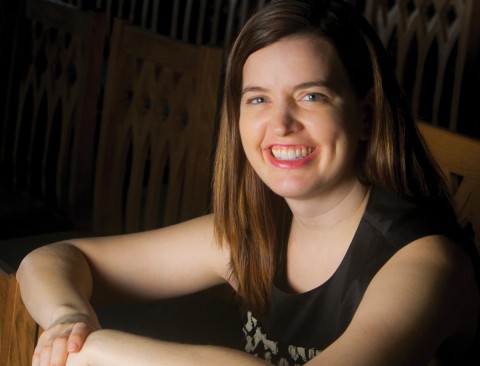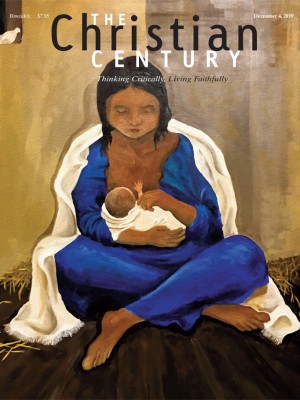The precarious position of evangelical women celebrities in the church
“These women are a puzzle hidden in plain sight.”

In her recent book The Preacher’s Wife: The Precarious Power of Evangelical Women Celebrities, Kate Bowler explores how Christian women, often denied formal positions of authority in the church, have nevertheless carved out positions of power. Some have used the role of being a pastor’s wife to become leaders in their own right as best-selling authors and teachers, creating their own media empire. Bowler teaches church history at Duke Divinity School. Her other books include Blessed: A History of the American Prosperity Gospel and Everything Happens for a Reason: And Other Lies I’ve Loved.
How do you define celebrity?
It is hard to define. And using the word Christian with it always feels slightly ironic. The term celebrity made it difficult to approach people for interviews. When I would say, “I am writing a book on celebrity preachers,” the person would inevitably say, “Then I have no idea why you would want to interview me.” They thought the term celebrity signaled inauthenticity.
Read our latest issue or browse back issues.
The term gestures to an entire industry that surrounds certain people. The person who is up on the stage requires so much backstage production—handlers, publicists, marketers, wardrobe people, and fetchers. Add to that layers of publishing, television, or social media.
We associate celebrity with the entertainment industry, and rightly so. It tells us something about our reach into the secular culture. In the 1950s, it wasn’t totally bizarre that Hollywood actress Colleen Townsend married a Presbyterian pastor. Presbyterians were considered part of mainstream culture. But nowadays, religious celebrities have to be buoyed up by their own attempts to create television, radio, and social media brands that can rival secular counterparts.
Mainline Christians tend to be skeptical of celebrity. Is that a mistake? Is celebrity a meaningful form of power to be used by religious people?
I think mainliners are skeptical in part because we are cultural winners. Because we are typically well-read, cultural ecumenists, cosmopolitans of various kinds, we don’t need to create a subculture in which we can see our own heroes thrive. We cannot imagine being proud to see one of our authors, from our subculture, on the shelf at Walmart. In many ways, our objections to celebrity are a veiled way of talking about class.
I’m very disappointed that the mainline no longer has the commercial machines it needs to create its own thought world. I am saying this to the Christian Century, one of the remaining machines of the Christian thought world. While that role makes the Century really precious, it also shows how imperiled these mainline industries are.
Mainliners lost any kind of TV presence in the 1960s when the Federal Communications Commission opened the airwaves and stopped subsidizing the mainline role. Mainliners got bought out by Pentecostals.
I have mixed feelings about whether it’s a good thing to compete in the marketplace as Christians. On the one hand, I think it makes us more responsive. For example, in receiving mail about my podcast, I learn so much about what my audience needs. It is teaching me to do ministry, and it feels really authentic. On the other hand, the pace of industry is so spectacularly quick that it is inherently punitive: people have to be perfect, and they have to be working at the speed of thought. This doesn’t lead to high-quality thought, and we mainliners like to think of ourselves as valuing high-quality thought, and even being the arbiters of it. That can make us so slow to move that we don’t change it all. By not keeping pace with the marketplace, we work our way out of a reason for being.
Evangelicals tend to be skeptical of women in formal positions of authority. Is celebrity a way of circumventing that dynamic?
Exploring that issue was the really fun part of the book. These women were a puzzle hidden in plain sight. These are women who by any logical account should not be as popular as they are. They are not theologically educated, and they are not encouraged to be on stage, so why are they there?
These women had to build their platforms extra-ecclesially. They had to find pulpit-adjacent places. Sometimes that involves parachurch ministries, like one focusing on a specific issue or a women’s ministry—something that is not threatening to the power structures and that is an extension of women’s previous dominance in the missionary movement.
Beth Moore is the most famous face of the Southern Baptist publishing arm. As evangelist and Bible teacher, she is a colossal money maker for her publisher, and she uses Twitter as her pulpit with tremendous success. Social media is very powerful in her world—it’s a way to reach an audience daily and weekly. Many women in this role have managed to skip a lot of the infrastructure and go directly to the crowd.
It is a delicate position because it is outside an institution. These women are not afforded any of the protections of an institution. If an institutional leader makes a mistake, the institution has a vested interest in protecting or rehabilitating them. You see this when there is a sex scandal in evangelical churches; the pastor is pretty quickly put on a rehabilitation tour. A woman without an institution is on her own. If she falls, she falls hard.
Southern Baptists want to adhere to a traditional approach to women in ministry, but they cannot square that demand with the number of women in their own tradition who are leading.
This is a country dominated by megachurches. The concentration of people into these churches is astonishing. That means leadership is concentrated in fewer and fewer hands. People want the male leader on stage to be “grounded,” and having a woman by his side confers emotional well-roundedness. It provides a kind of spiritual covering. She is credentialing him. Women in this role can become very powerful in their congregations. They have to figure out how to minister spiritually to all the women in the congregation. That gives women a job and a platform. This aspect of modern congregations makes it very difficult for women to be kept out of the pulpit.
Is the situation for black women different from that of white women?
They have similar roles: to be a paragon of female virtue, motherhood, and beauty. Black woman also have to bear the weight of cultural respectability. They often have to model “the perfect black family” for the culture.
You end the book talking about Amy Butler, who recently resigned as senior pastor at Riverside Church in Manhattan. Does her resignation say anything about celebrity and mainline women in ministry.
One of the saddest parts of writing this book was seeing how very easily any woman falls from a position of authority. As I researched and wrote the book, the women I was tracking as examples of this particular kind of power kept getting crossed off the list.
That tells us a few things. One, there are very few paths to power for women, regardless of their theological background. Two, churches are complicated institutions, and it takes a very specific kind of person to maintain power inside them. It is discouraging to see how narrow the scripts are that women have to follow. If you deviate from the script or even if you make a genuine mistake, your chances of survival are slim.
Read LaVonne Neff's review of Bowler's book.
A version of this article appears in the print edition under the title “Women and power.”







